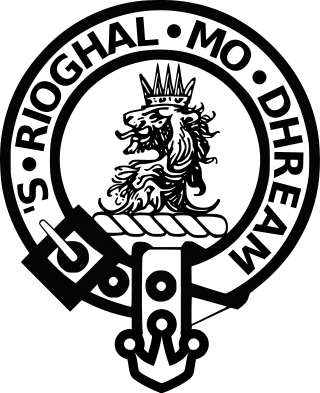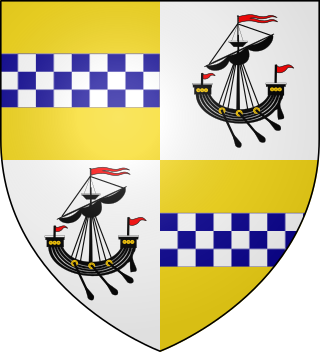
Clan Campbell is a Highland Scottish clan, historically one of the largest and most powerful of the Highland clans. The Clan Campbell lands are in Argyll and within their lands lies Ben Cruachan. The chief of the clan became Earl of Argyll and later Duke of Argyll.

Clan Donald, also known as Clan MacDonald, is a Highland Scottish clan and one of the largest Scottish clans. The Lord Lyon King of Arms, the Scottish official with responsibility for regulating heraldry in that country, issuing new grants of coats of arms, and serving as the judge of the Court of the Lord Lyon, recognises under Scottish law the High Chief of Clan Donald. Historically the chiefs of the Clan Donald held the title of Lord of the Isles until 1493 and two of those chiefs also held the title of Earl of Ross until 1476. Queen Mary of Denmark is member of Clan Donald.

Clan Mackintosh is a Scottish clan from Inverness in the Scottish Highlands. The chiefs of the clan are the Mackintoshes of Mackintosh. Another branch of the clan, the Mackintoshes of Torcastle, are the chiefs of Clan Chattan, a historic confederation of clans.

Clan MacDonell of Glengarry, also known as Clan Ranald of Knoydart & Glengarry is a Scottish clan and is a branch of the larger Clan Donald. The clan takes its name from River Garry where the river Garry runs eastwards through Loch Garry to join the Great Glen about 16 miles (25 km) north of Fort William, Highland. The progenitor of the MacDonells of Glengarry is Reginald, 4th great-grandson of the warrior Somerled. The clan chief is traditionally designated as the "Son of Alexander's son".

Clan MacDougall is a Highland Scottish clan, historically based in and around Argyll. The Lord Lyon King of Arms, the Scottish official with responsibility for regulating heraldry in Scotland, issuing new grants of coats of arms, and serving as the judge of the Court of the Lord Lyon, recognizes under Scottish law the Chief of Clan MacDougall. The MacDougall chiefs share a common ancestry with the chiefs of Clan Donald in descent from Somerled of the 12th century. In the 13th century the Clan MacDougall whose chiefs were the original Lords of Argyll and later Lords of Lorne was the most powerful clan in the Western Highlands. During the Wars of Scottish Independence the MacDougalls sided with the Clan Comyn whose chiefs rivaled Robert the Bruce for the Scottish Crown and this resulted in clan battles between the MacDougalls and Bruce. This marked the MacDougall's fall from power and led to the rise of their relatives, the Clan Donald, who had supported Bruce and also the rise to power of the Clan Campbell who were then the habitual enemies of the MacDougalls and later of Clan Donald.

Clan Gregor, also known as Clan MacGregor, is a Highland Scottish clan that claims an origin in the early 9th century. The clan's most famous member is Rob Roy MacGregor of the late 17th and early 18th centuries. The clan is also known to have been among the first families of Scotland to begin playing the bagpipes in the early 17th century.

Clan Cameron is a West Highland Scottish clan, with one main branch Lochiel, and numerous cadet branches. The Clan Cameron lands are in Lochaber and within their lands lies Ben Nevis which is the highest mountain in the British Isles. The Chief of the clan is customarily referred to as simply "Lochiel".

Clan MacIntyre (McIntyre) is a Highland Scottish clan. The name MacIntyre, means "son of the carpenter.” It is most commonly said to descend from Maurice Mac Neil a nephew of Somerled, the great 12th century leader of the Scottish Gaels. Through an ingenious strategy, Maurice secured the marriage of Somerled to the daughter of the King of Mann and the Isles, thus greatly increasing Somerled's territories. At an unknown date the clan journeyed from the Hebrides to the Scottish mainland where the chiefs established their home at Glen Noe, in Ardchattan Parish, on the east side of Loch Etive.

The Battle of Mulroy was a Scottish clan battle fought in August 1688 in the Lochaber district of Scotland. It was fought between the Clan Mackintosh who were supported by government troops under Kenneth Mackenzie of Suddie against the Clan MacDonald of Keppoch who were supported by the Clan Cameron over disputed lands in the Braes of Lochaber. The battlefield has been inventoried and protected by Historic Scotland under the Scottish Historical Environment Policy of 2009.

Clan Macdonald of Clanranald, also known as Clan Ranald, is a Highland Scottish clan and a branch of Clan Donald, one of the largest Scottish clans. The founder of the Macdonalds of Clanranald is Reginald, 4th great-grandson of Somerled. The Macdonalds of Clanranald descend from Reginald's elder son Allan and the MacDonells of Glengarry descend from his younger son Donald. The clan chief of the MacDonalds of Clanranald is traditionally designated as The Captain of Clanranald and today both the chief and clan are recognised by the Lord Lyon King of Arms, the heraldic judge in Scotland.

Clan MacDonald of Keppoch, also known as Clan MacDonellof Keppoch or Clan Ranald of Lochaber, is a Highland Scottish clan and a branch of Clan Donald. The progenitor of the clan is Alistair Carrach MacDonald, 4th great-grandson of the warrior Somerled. The clan chief is traditionally designated as the "Son of Ranald's son".

The Appin Murder was the assassination of Colin Roy Campbell, the Clan Campbell tacksman of Glenure, on 14 May 1752 near Appin in the west of Scotland. The murder occurred in the aftermath of the Jacobite Rising of 1745 and led to the execution of James Stewart of the Glens, often characterized as a notorious miscarriage of justice. The murder inspired events in Robert Louis Stevenson's 1886 novel Kidnapped and its sequel Catriona.

Clan MacLaren is a Highland Scottish clan. Traditional clan lands include the old parish of Balquhidder which includes the villages of Lochearnhead and Strathyre, and is about 18 miles (29 km) long and 7 miles (11 km) broad, spanning 54,675 acres (22,126 ha), long known as "Maclaren Country".

The MacDonalds of Glencoe, also known as Clann Iain Abrach, is a Highland Scottish clan and a branch of the larger Clan Donald. Named after Glen Coe, the MacDonalds lived there from the early 14th century, until the glen was largely abandoned during the Highland Clearances of the late 18th century.

Clan Stewart of Appin is the West Highland branch of the Clan Stewart and have been a distinct clan since their establishment in the 15th century. Their Chiefs are descended from Sir James Stewart of Perston, who was himself the grandson of Alexander Stewart, the fourth High Steward of Scotland. His cousin Walter Stewart, the 6th High Steward, married Marjorie Bruce, the daughter of King Robert the Bruce, and their son Robert II was the first Stewart Monarch. The Stewarts of Appin are cousins to the Royal Stewart Monarchy.

The Battle of Glen Fruin was a Scottish clan battle fought on 7 February 1603 between the Clan Gregor and its allies on one side, and the Clan Colquhoun and its allies on the other. The Clan Gregor and Clan Colquhoun were at feud due to the MacGregors carrying out raids on the Colquhoun's lands. The Colquhouns gained royal support and raised an army against the MacGregors. However, during the subsequent battle of Glen Fruin, the Colquhouns were comprehensively defeated. Glen Fruin is in the Loch Lomond area, in the county of Dunbartonshire, Scotland. In the aftermath of the battle royal policy punished the MacGregors for 150 years.

The Campbell of Auchinbreck family was founded by Duncan Campbell in Glassary, Argyll, Scotland. He was the son of Lord Duncan Campbell, first Lord Campbell of the Clan Campbell, by his second wife Margaret, daughter of Sir John Stewart of Blackhall, the illegitimate son of King Robert III of Scotland. The family of the Lords Campbell later became Dukes of Argyll, and remain chiefs of Clan Campbell. Duncan Campbell, as a grandson of King Robert III, received a considerable estate confirmed by royal charter dated 19 June 1452. The family remained at their estate of Auchinbreck, from which they took their title, until 1641. The Campbells of Auchinbreck were commissioned to provide military training and were used by the Earls of Argyll as military support. In 1628 the then head of the family of Campbells in Auchinbreck received a baronetcy, which included a grant of North American land in Nova Scotia.

Alexander Macdonald, 17th of Keppoch was a Scottish Jacobite and clan chief who took part in both the 1715 and 1745 Jacobite risings. He was killed at the Battle of Culloden leading a regiment composed largely of members of his clan, the MacDonalds of Keppoch.

The Battle of Stalc was a Scottish clan battle that was fought in the year 1468. It was fought between the forces of the Clan Stewart of Appin and their allies the Clan MacLaren against the Clan MacDougall and the Clan MacFarlane. The latter force may have included men from the Clan Campbell.
The Dewar Manuscripts are a collection of oral folktales of the Scottish Highlands, recorded in writing between 1863 and 1871 by John Dewar. Dewar's writings were first translated from Gaelic to English in 1879 and since then have been published in multiple formats. The collection of the folktales was intended to ensure that they were not forgotten by the population of the Scottish Highlands, and the manuscripts serve today as both a cultural record and historical source.



















